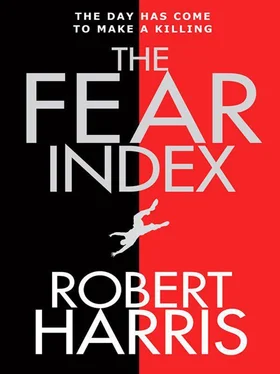Robert Harris - The Fear Index
Здесь есть возможность читать онлайн «Robert Harris - The Fear Index» весь текст электронной книги совершенно бесплатно (целиком полную версию без сокращений). В некоторых случаях можно слушать аудио, скачать через торрент в формате fb2 и присутствует краткое содержание. Жанр: Триллер, на английском языке. Описание произведения, (предисловие) а так же отзывы посетителей доступны на портале библиотеки ЛибКат.
- Название:The Fear Index
- Автор:
- Жанр:
- Год:неизвестен
- ISBN:нет данных
- Рейтинг книги:4 / 5. Голосов: 1
-
Избранное:Добавить в избранное
- Отзывы:
-
Ваша оценка:
- 80
- 1
- 2
- 3
- 4
- 5
The Fear Index: краткое содержание, описание и аннотация
Предлагаем к чтению аннотацию, описание, краткое содержание или предисловие (зависит от того, что написал сам автор книги «The Fear Index»). Если вы не нашли необходимую информацию о книге — напишите в комментариях, мы постараемся отыскать её.
The Fear Index — читать онлайн бесплатно полную книгу (весь текст) целиком
Ниже представлен текст книги, разбитый по страницам. Система сохранения места последней прочитанной страницы, позволяет с удобством читать онлайн бесплатно книгу «The Fear Index», без необходимости каждый раз заново искать на чём Вы остановились. Поставьте закладку, и сможете в любой момент перейти на страницу, на которой закончили чтение.
Интервал:
Закладка:
Light falling from the upper floors showed Rajamani lying face down in the well of the elevator shaft. There was a puddle of blood the size of a dinner plate that seemed to be growing out of the top of his skull. His photographs lay scattered around him. Hoffmann jumped down next to him. Broken glass crunched under his feet. There was an incongruous smell of tea. He stooped and grasped Rajamani’s hand, which was shockingly warm and smooth, and for the second time that day tried to feel for a man’s pulse, but again he couldn’t find one. Behind and just above him, the doors rattled shut. Hoffmann looked around in panic as the elevator car began its descent. The tube of light shrank rapidly as the car hurtled down – the fifth floor went, and then the fourth. He grabbed the crowbar and tried to jam it back between the doors, but lost his footing. He fell backwards and lay next to Rajamani’s corpse, looking up at the bottom of the car as it hurtled at him, holding the crowbar upright in both hands above his head like a spear to fend off a charging beast. He felt the oily wind on his face. The light faded, vanished, something heavy hit his shoulder, and then the crowbar jumped and went as rigid as a pit prop. For several seconds he could feel it taking the strain. He was screaming blindly into the absolute darkness at the elevator’s floor, which must have been only inches from his face, braced for the crowbar to bend or slip. But then a gear changed, the note of the motor became a whine, the crowbar came loose in his hands and the car began to rise, accelerating rapidly all the way up its cathedral column of glass, uncovering floor after floor of fresh white light, which poured down into the pit.
He scrambled up and shoved the crowbar back between the doors, working it into the gap, parting them a fraction. The elevator had climbed to its highest point and stopped. There was a clunk, and he heard it start to plunge again. He hoisted himself up and jammed his fingers into the narrow opening. He clung there, feet wide apart, muscles straining. He threw back his head and roared with the effort. The doors gave slightly, then flew wide open. A shadow fell across his back, and in a rush of air and a roar of machinery he launched himself forward on to the concrete floor.
Leclerc in his office at police headquarters and on the point of going home when he received a call that a body had been discovered in a hotel on the Rue de Berne. He guessed at once from the description – gaunt face, ponytail, leather coat – that it was the man who had attacked Hoffmann. Cause of death, he was told, appeared to be strangulation, although whether it was suicide or murder was not immediately clear. The victim was a German: Johannes Karp, aged fifty-eight. Leclerc rang his wife for the second time that day to say he was delayed at work, and set off in the back of a patrol car through the rush-hour traffic to the northern side of the river.
He had been on duty for almost twenty hours and was as exhausted as an old dog. But the prospect of a suspicious death, of which there are only about eight per year in Geneva, always bucked up his spirits. With flashing light display, a piercing siren and an air of great self-importance, the patrol car roared up the Boulevard Carl-Vogt and over the bridge, cutting into the left-hand lane of the Rue de Sous-Terre, forcing the oncoming traffic to swerve out of its way. Thrown around in the back seat, Leclerc rang the chief’s office and left a message that the suspect in the Hoffmann case apparently had been found dead.
In the Rue de Berne there was almost a carnival atmosphere outside the Hotel Diodati – four police cars with flickering blue lights, sharply brilliant in the overcast early-evening gloom; a sizeable crowd on the opposite side of the street, including several glossy black hookers in colourful, minimal clothes, joking with the locals; fluttering lines of stripy black-and-yellow crime-scene tape sectioning off the spectators. Occasionally a camera flashed. They were like fans, thought Leclerc as he got out of the car, waiting for a star to come out. A gendarme lifted the tape and Leclerc ducked underneath it. As a young man he had patrolled this area on foot, had got to know all the working girls by name. He guessed some of them would be grandmothers now; come to think of it, one or two had been grandmothers then.
He went inside the Diodati. It had been called something else in the eighties. He couldn’t remember what. The guests had all been corralled in reception and were not being allowed to leave until they had each given a statement. There were several obvious hookers here, and a couple of smartly dressed men who should have known better and who stood apart, surly with embarrassment. Leclerc didn’t like the look of the tiny elevator so took the stairs, pausing on each deserted floor to recover his breath. Outside the room where the body had been found, the corridor was crowded with uniforms and he had to put on white coveralls, white latex gloves, and clear plastic slipovers on his shoes. He drew the line at pulling up the hood. I look like a damned white rabbit, he thought.
He didn’t know the detective in charge of the crime scene – a new fellow named Moynier, apparently in his twenties, although it was hard to tell as he had his hood up and only the baby-pink oval of his face was visible. Also in the room in their white suits were the pathologist and the photographer, both old hands, but not as old as Leclerc; no one was as old as Leclerc; he was as old as the Jura. He contemplated the corpse, hanging off the bathroom door handle. Above the tight line of the ligature, which was buried in the flesh of the neck, the head had turned black. There were various cuts and abrasions on the face. One eye was badly swollen. Strung up and skinny, the German looked like an old dead crow left out by a farmer to discourage other carrion. In the bathroom there was no light switch, but even so it was possible to see the blood smeared on the toilet bowl. The shower curtain rail was hanging away from the wall; so was the washbasin.
Moynier said, ‘A man next door swears he heard sounds of a struggle sometime around three. There’s also blood by the bed. I’m provisionally declaring it a murder.’
‘Smart work,’ said Leclerc.
The pathologist coughed to cover his laughter.
Moynier didn’t notice. He said, ‘I was right to call you? Do you think this is the man who attacked the American banker?’
‘I should say so.’
‘Well then, I hope you don’t object, Leclerc, but I was here first, and so I must insist that this is my case now.’
‘My dear fellow, you’re welcome to it.’
Leclerc wondered how the occupant of this squalid room could possibly have come to intersect with the owner of a $60 million mansion in Cologny. On the bed the dead man’s possessions had been individually bagged in clear plastic and laid out for inspection: clothes, a camera, two knives, a raincoat apparently slashed at the front. Hoffmann had worn a raincoat like that when he went to the hospital, Leclerc thought. He picked up a mains adaptor.
He said, ‘Isn’t this for a computer? Where is it?’
Moynier shrugged. ‘There isn’t one here.’
Leclerc’s mobile phone rang. It was in his jacket pocket. He couldn’t get at it through his damned rabbit suit. Irritably he unzipped the coveralls and pulled off his gloves. Moynier started to protest about contamination, but Leclerc turned his back on him. The caller was his assistant, young Lullin, who was still in the office. He said he had just been looking at the afternoon log. A psychiatrist, a Dr Polidori in Vernier, had called a couple of hours earlier about a patient of hers showing potentially dangerous schizophrenic symptoms – he had been in a fight, she said – but when the patrol got to her surgery he was gone. His name was Alexander Hoffmann. The psych didn’t have a recent address, but she had given a description.
Читать дальшеИнтервал:
Закладка:
Похожие книги на «The Fear Index»
Представляем Вашему вниманию похожие книги на «The Fear Index» списком для выбора. Мы отобрали схожую по названию и смыслу литературу в надежде предоставить читателям больше вариантов отыскать новые, интересные, ещё непрочитанные произведения.
Обсуждение, отзывы о книге «The Fear Index» и просто собственные мнения читателей. Оставьте ваши комментарии, напишите, что Вы думаете о произведении, его смысле или главных героях. Укажите что конкретно понравилось, а что нет, и почему Вы так считаете.










